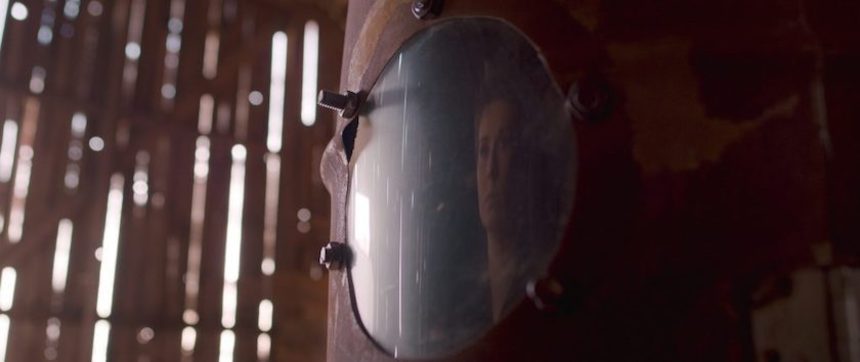Review: SHIFTER Combines Body Horror and Time Travel to Occasionally Disturbing Effect
Nicole Fancher, Ashley Mandanas and Jamie Brewster star in Jacob Leighton Burns' sci-fi horror film, now available On Demand.

In the Before Times, Shifter, writer-director Jacob Leighton Burns’ micro-budgeted sci-fi/horror mashup of H. G. Wells’ The Time Machine, Shane Carruth's Primer, Nacho Vigalondo’'s Timecrimes, and David Cronenberg’s cult remake of The Fly, was set for a regular theatrical release after premiering at a pre-shutdown Cinequest, a genre-centric, San Francisco Bay Area film festival, but with other festivals on indefinite hiatus and movie theaters shuttered for the immediate future, Shifter’s distributors slid over to where so many films, big-budget and small, high-profile and low, have gone before: video-on-demand.
Working from a slow-burn script co-written with his brother, Zachary, Burns takes an intriguingly time- and mind-bending premise to its natural, if ultimately downbeat, conclusion that reaffirms an over-familiar, over-familiar, centuries-old theme traceable to Mary Shelley and Frankenstein: A Modern Prometheus: Mess with Mother Nature or Father Time and Mother Nature or Father Time will mess right back, often to deleteriously permanent, likely gruesome effect.
When we first meet Shifter's central character, Theresa Chaney (Nicole Fancher), a lonely, newly orphaned twenty-something and part-time inventor, she’s hard at work, putting the finishing touches on a homemade time machine cobbled together from bits and bobs of farm machinery, an old school desktop PC, and a few science equations deliberately kept from the audience (presumably so we won’t try Teresa’s experiments at home). On the verge of proving her theories correct, she sends her cat, Bernard, first through the time machine.
He later reappears looking and sounding fine, giving Theresa the confidence she needs to try the time machine on a willing human subject (i.e., herself). Time Travel Lesson Number 1: Wait, hesitate, and otherwise delay the first human attempt at time travel until rigorously testing the first, non-human subject for any long-term side-effects. It’s a lesson that also applies to first-time uses of teleportation technology.
At least initially, Theresa’s first travel through time, a time jump just two hours in the past to sabotage her earlier self before she makes a potentially bad, no-good, terrible romantic decision, goes as well as expected, as does the next day back at her day job operating heavy machinery of some kind. Then come the feelings of nausea and disorientation, followed by odd-looking skin blotches, and finally, after what looks and sounds like Theresa’s giving birth to herself, jumping backward or forward in time without using the time machine.
Theresa becomes literally unstuck in time, incurable of controlling her disappearances. Not surprisingly, that makes her work life untenable. Even the first, awkward steps in what could be a life-altering romantic relationship with a punkish part-time librarian, Blake Douglass (Ashley Mandanas), goes predictably sideways.
Not surprisingly, Shifter has a disjointed, episodic quality as Theresa’s time jumps seem to start and stop without rhyme or reason. Presumably by design, that episodic quality repeatedly robs Shifter of tension or suspense, all but literally forcing Theresa to fend for herself, stumbling through one brief, perfunctory vignette after another while Theresa attempts to find a solution for her temporal impermanence with increasing desperation.
Burns obviously intended to explore the side effects of time travel on Theresa’s increasingly fragile emotional and mental state, but perplexingly fails to create a narrative structure or scaffold around Theresa’s unmoored time jumps. Thematically, Burns attempts to tie Theresa’s time travels as a stumbling search for a personal identity beyond a life constrained by obligation and duty (she skipped college to nurse an ailing father suffering from dementia), but there again, Burns loses the metaphorical thread, leaving Theresa and by extension, viewers, just as unmoored and unfulfilled.
Unfortunately, Burns the co-screenwriter periodically fails Burns the director. Uneven execution undermines the combination of a convincing central performance, a possibility-rich premise, and inventive, imaginative visuals (Burns’ experience as a long-time cinematographer serves extremely him well here). Perhaps next time Burns will set aside or delegate screenwriting duties and focus primarily on directing. Considering the budget (roughly $30K, exclusive of prints and advertising) that put obvious constraints on production, Burns shows significant promise as a filmmaker.
The film is now available to watch on a variety of Video On Demand platforms. Visit the official Facebook page for more information.







